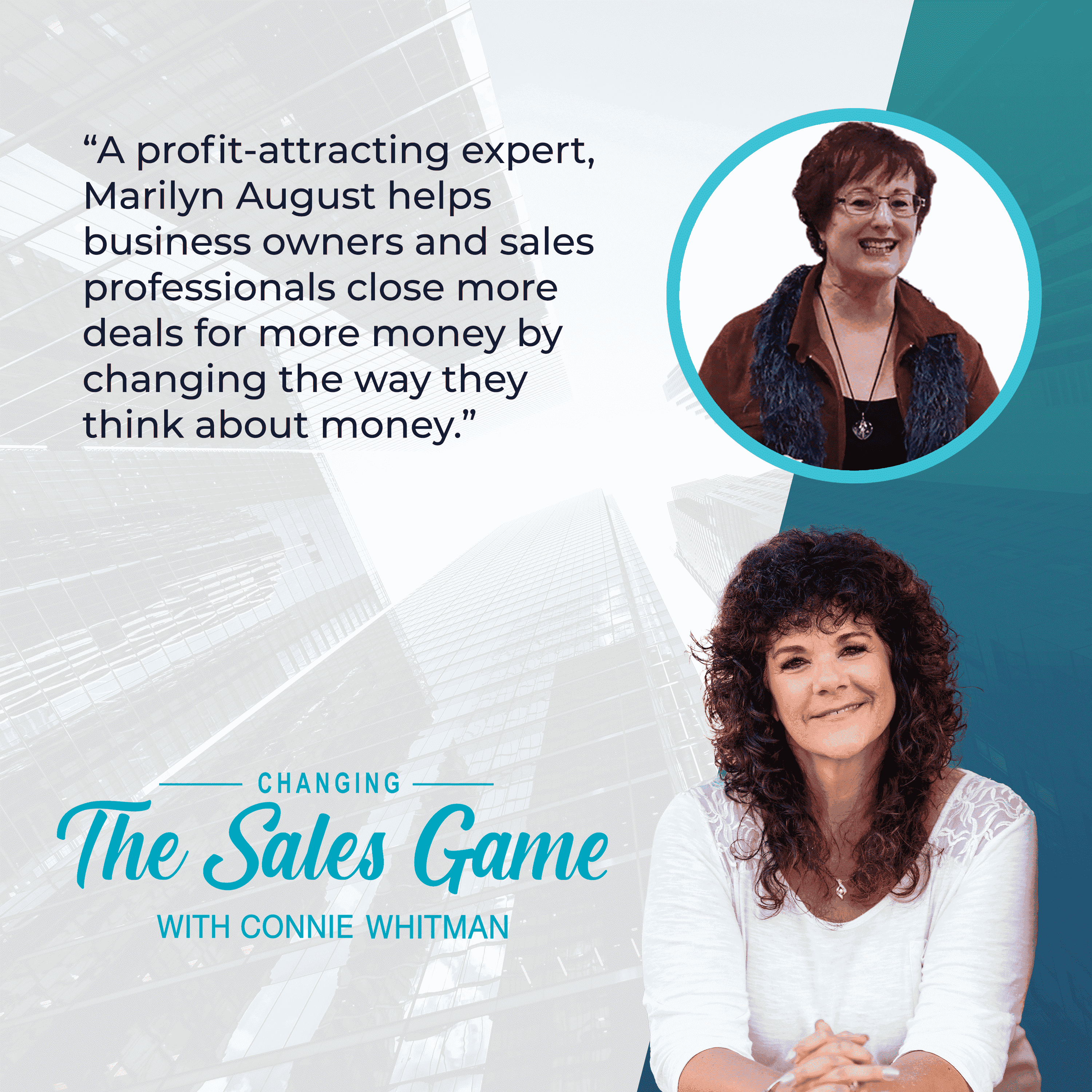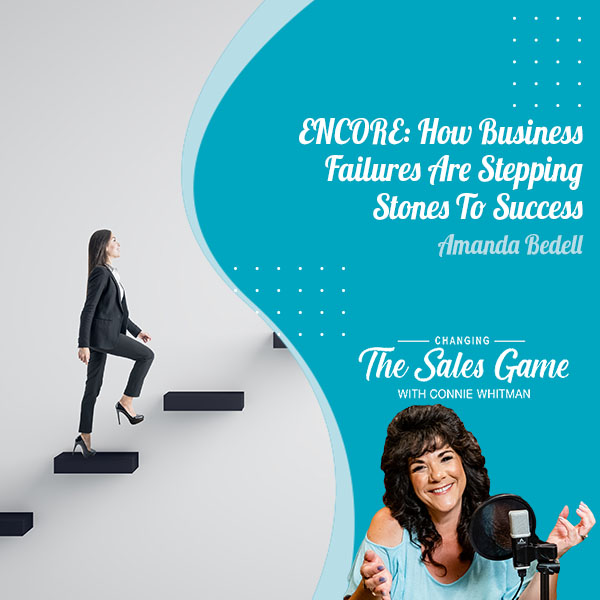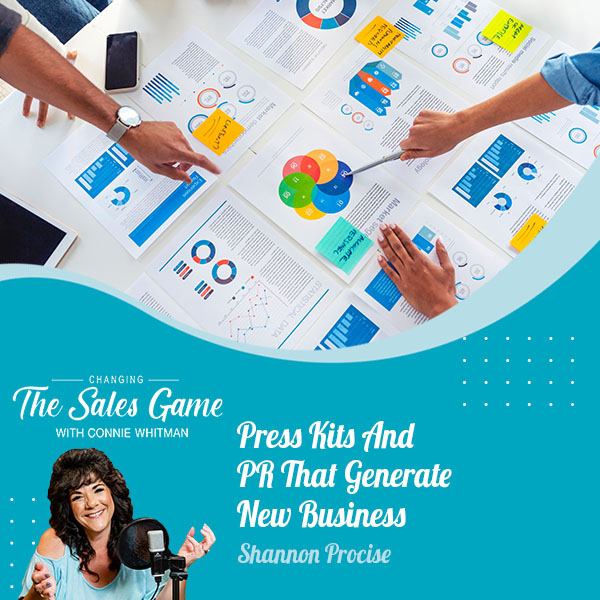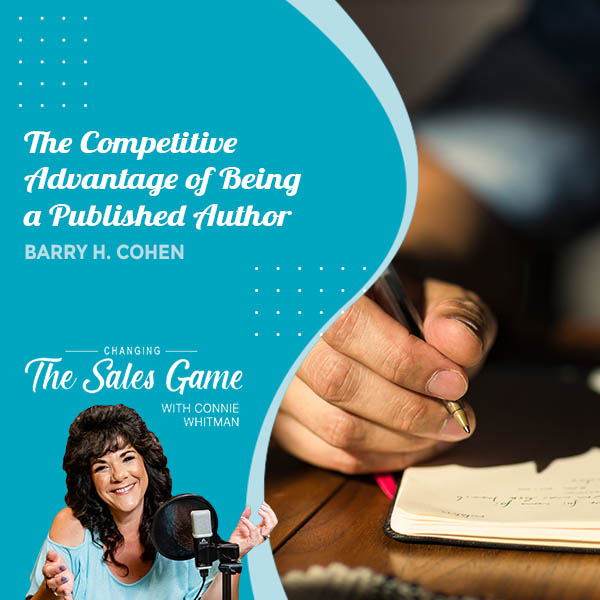“Quality performance starts with a positive attitude.”
Jeffrey Gitomer
Check Out These Highlights:
Through the years I have used different behavioral models or tools like DISC, and now my own Communication Style Assessment (that I shared in the intro of this show).
These valuable tools are great resources to help you better understand your prospect’s buying style as well as your own communication style, so you are always connecting and approaching your prospect in the correct way.
So how can we use this type of information to build our skills to master our prospecting efforts, so in the end, we are able to serve our clients in a bigger and better way, and of course make more sales?
Mastering Money Mindset With Marilyn August (EP. 80)
Every episode you read, I hope that you feel my mission and passion to change the word sales from something that’s icky, sleazy, and manipulative so that we can start to shift our paradigm of thinking and come from love, care, and respect. It’s more fun, a lot easier, and people respond in such a better way. To help you on this mindset journey, I have a free gift for you. It’s my Communication Style Assessment.
You get two reports. One shows your natural superpower as it relates to communication and how you are perceived in the world. On the flip side, I also give you your lowest style score, which is usually our blind spot. I shine some light on that for you so that you can understand when you’re speaking with people that are in your blind spot or communicate from that perspective, what you need to do to shift to be able to connect with them on a deeper level. You get those two reports. Go to ChangingTheSalesGame.com/Communication-Style-Assessment.
My motivational quote in this episode is by Jeffrey Gitomer. Jeffrey says, “Quality performance starts with a positive attitude.” Through the years, I’ve used different behavioral models or tools. In this case, DiSC was the one that I was certified in many years ago. Now is my Communication Style Assessment. These valuable tools are such great resources to help us better understand your specific prospect’s buying style, as well as your communication style so that we’re always connecting and approaching, in this case, your prospect in the correct way.
How can we use this type of information to build our skills and master our prospecting efforts so that in the end, we’re able to serve our clients, hopefully in a bigger and better way, and make more sales? My amazing guest is Marilyn August. Marilyn is a profit-attracting expert. She’s my kind of gal. She helps business owners and sales professionals close more deals for more money by changing the way they think about money.
Marilyn is an author and business development strategist on the science of attracting high-paying clients, providing a complete one-stop spectrum of business development technologies to accelerate your business and sales revenue. Please help me welcome Marilyn to the show. Thanks for being on, Marilyn. I’m so excited about our conversation.
About Marilyn August:
Marilyn is a profit-attracting expert. She helps business owners and sales professionals close more deals for more money by changing the way they think about money. Marilyn is an author and Business Development Strategist on the Science of Attracting High-Paying Clients providing a complete one-stop spectrum of business development technologies to accelerate your business and sales revenues.
How to Get in Touch with Marilyn August:
- Email: marilyn@profitgps.com
- Website: http://profitgpsclub.com/
I’m delighted to be here.
I’m always delighted to do my show but I’m delighted that you’re here with me.
Thank you, Connie. I felt a connection right away.
We met and it was like a love fest right out of the gate. It’s cool when you meet people like that. We’ll create great content for everybody reading. My first question is, tell us a bit about your why and how you came to have this B2B business, owner sales-focus in your business.
I was a corporate trainer and I was one of those people who never fit but my entire life probably, and they’ve traced it going back generations, there’s been financial problems and difficulties with money. I decided that I needed to fix myself. Women tend to do that. We’re like, “There’s something wrong with me.” I became a self-help junkie. I warn people don’t become self-help junkies because guess what’ll happen. I developed a six-week transformational training, which I’m going to be bringing back in the form of an online course on what would be called The Psychology of Money.
Here I was, Connie. I built the field. I had the greatest, latest, wonderful training. As the saying goes, “I built the field and they did not come.” Nobody knew I had the latest and greatest. I had to learn about sales. I knew nothing about sales. I thought sales was a four-letter word like everybody else. I became a student of sales and marketing, both formally and informally, and a consultant for the small business development center. I learned that sales make the world go round.
Sales make the world go round. If you're in sales, your income is unlimited. Share on XI was attracting salespeople and business owners to my six-week program because they have charge of their financial destiny. If you’re in sales, your income is unlimited. That’s how I evolved. Those are the CliffsNotes. I left off the trauma and drama. The why is to heal, break through my revenue roadblocks and help others break through theirs. This started with me, helping my own and others. I’m a big believer in walking my talk.
We all have crap. You and I have lived. When people introduce me, they say, “Connie is a seasoned professional.” Immediately, I get up and start saying, “Yes, because I’m hot and spicy.” That word seasoned is equating with old and I’m hot and spicy. It’s true. Sometimes, we have to start and learn for ourselves to be able to thrive, whatever that means or whatever industry we’re in before we can go and help or teach others.
I do agree with that. The why was your almost survival story and then the generosity kicks in. You’re like, “Who can I share that with? Who can I help? I’ve gone through it. I don’t think that I’m an anomaly.” Other people are probably going through the same stuff, maybe a different story to it. At the core, we all have money issues. I have money issues. If you think you don’t, you’re crazy.
A lot of it comes from our early childhood, things you see that you don’t necessarily understand or things that your mom said, “Money doesn’t grow on trees,” and stuff like that. All of us have some kind of programming and there’s usually some disconnect or issue with money. Here’s the next question and I love this. This is so important. Why do you say that every sale starts between your two ears?
Attitude Is Everything
It’s like what you said. Attitude is everything. Attitude is 80% of your sale. The easiest way to illustrate this is to tell this quick story about a client I had who was on his way to making his latest, greatest, biggest sale in the world. We called him a people person. He was in the car and calling me. He “needed the sale.” He was giving off all kinds of needy vibes without knowing it. It was the biggest sale he would’ve made that quarter.

All this talk is going on inside of his head and everything he knew about his skillset and behaviors in the past was running around in his head. Talk about on-demand coaching. I needed to calm him down and have this be just another sale. What was going on between his two ears? You give off an energetic vibe. Did you ever notice when you need the sale and it never happens?
Yes.
It’s weird but it’s happened to me too many times. We needed to shift his attitude to, “This is just another day. This is the sale I make. There’s no big deal if I make it or don’t make it.” In his entire internal self-talk, he was over-preparing and over-scripted. His behavior was being driven by what I call head trash, what was going on in his head, because this was important. The significance you give it is why I say it starts between your ears, what you learned as a kid and your last experience with a salesperson.
Also, when we go out and you have a horrible representative no matter what the venue is. They’re pushy. “That’s a salesperson. I started with that.” Sales should not be icky and sleazy. I told a class for one of my corporate clients, four peers and then younger people. As we were talking, I said, “Everybody thinks sales is this icky thing. Take the word sales out of your head. I want you to think about you coming and whomever that client is. I don’t care if they’re a business owner, grandma, or a kid fresh out of college.”
It was a bank that I was working with. I said, “What client is in front of you? Do you want to help them?” “Yes.” “You have to start thinking about, ‘How can I serve them to the best of my ability and take what I know and what offers I have available that’s going to help them in their situation?’” It should not be, “The bank is telling us home equity so I’m going to push them home equity.” The person in front of you is renting. Why are you talking about home equity?
“Who’s in front of me? How can I customize that conversation so that I deliver exactly what they need right here and right now?” As well as build trust so that they trust you for the future to come back to you later on. That’s how we keep our pipeline full. It was so cute, Marilyn. They all sat there and went, “I like that.” We shifted their feeling, what was going on between their ears. I’m going to use your terminology here.
As soon as you give them an alternative perspective of how to do it properly so everybody wins, including the client, not that we’re out to get the client, they were like, “Oh.” They were all ears and they started talking. The energy in the room changed. It was wonderful. It starts between our ears. I love that. We talk ourselves out of making the sale because of the vibrational energy we’re sending off.
Sale Is Not A Four-Letter Word
You may borrow. Sales is not a four-letter word. It’s the title of that program you did. There was a book out by that name but it’s out of print so it’s safe to use that. It’s our preconceived notions and perceptions of salespersons. A lot of companies won’t even use the word sales. They have account reps. The very word has a negative connotation.
Interestingly, if you were working with a bank, they’re talking about money. What they don’t realize is they’re stripping a person naked when they talk about money. If you want any thoughts on that, we can certainly have that offline. She’s bringing to go outside. The point is it does start between your ears because you bring your beliefs, attitudes, and past experiences with money, which I could go on and on.
It’s the elephant in the room.
That’s exactly a great way to talk about it.
Why do sales and business owners too? I have both. I have salespeople who work for corporations and they are business owners. Why do they need to know about their prospect’s attitude about money? We’re talking about our own but what about our prospect’s attitude? As you said, they were stripped naked.
Three Steps To Change
There are three that you need to know about, as you need to know your own. Awareness is the first step to change. For example, I tell the Charlie story where your prospect has had a fight with their spouse about money. You don’t know that. They’re not telling you. Prospects are worried about their marriage. What do they say to you? They say, “We can’t afford it.”
Awareness is the first step toward change. Share on XWhat I had to learn is that your ‘can’t afford it’ isn’t necessarily my ‘can’t afford it.’ We’re very vague when we talk about the money question. My expensive isn’t your expensive. We are triggered by our prospect’s hidden agenda that we don’t know anything about. If they had that bad salesperson experience, they’re going to project all over you. Sales is 80% psychology or maybe even more.
It’s like the iceberg, maybe 90%.
Their past experiences with salespeople and their boss’s demands on them, all that’s going to play in their personal life, whatever’s going on in their personal life. Whatever they were taught about money is going to come into play. Don’t trust any salespeople. Use car sales for people. I was thinking about a new car myself. We do this ourselves. I would not walk into a dealership without doing my research. The last time I bought a car, I strolled in there knowing I’m going to get jammed. It’s the expectation that your prospect has.
I don’t know our topics for this episode but one of the reasons I discouraged discounting and have written extensively about that is because then your prospect’s mind is going, “What’s the real price?” You think you’re doing a deal and you’re shaving your commission. You’re doing the prospect a favor. What’s going on in the prospect’s head is, “I wonder what the real price is if I press this person even more.”
Your prospect’s attitude is very important but there is a third one. That’s the collective consciousness that you have to be aware of when you’re going into sales. There’s a lot of negativity about rich people. We’re in a very interesting time. We all aspire to get rich, yet there are these terrible rich people. They’re ripping us off to get rich. Crooks has been around for a long time. That’s a perfect way to say it. They’re crooks.
The only way I can get rich is to be a crook, which is what happens. What I’ve learned is it’s not the money that makes the person. It’s the person that makes the money. I had to come up with a term to describe this. I use richly fulfilled. There are a lot of good people that can do a lot of good with money, do more good with money than you can if you don’t have money. It’s the old layer line talk, “Put on your financial mask first and then help others.”
It's not the money that makes the person. It's the person that makes the money. Share on XI have two comments. That was well said. Many years ago, when I started as a financial advisor, I got my license and worked in insurance. I transitioned over to banking. I grew up in financial sales. That’s my world, MBA and finance, all of that. I remember I walked in. I was probably maybe 25 or 26 at the time, Marilyn. It was a Saturday appointment at the bank. I went into the manager’s office and the gentleman came in, no joke. He looked at me and said, “You’re young and you’re a girl. I don’t know if I could work with you.” I was in my twenties. I was filled with vim and vigor back then. Now, I’m too tired.
I thought to myself, “Do I punch him in the face?” I did not get violent. I calmly said to him, “You’re here. I’m here. Why don’t I start to explore? Give me ten minutes. If in ten minutes you don’t feel that I can add value to your financial situation and our conversation, I have a colleague and a peer that I certainly, on Monday, can send an introduction to.” There was no email back then. “I can have him call you but we’re here. What do you think? I’ll get some preliminary information and I can share it.” He goes, “Attitude though. All right.”
We sit down. I’m thinking, “You have to stop in 10 minutes because you told him 10 minutes.” As a kid, I was a nervous wreck but I went through it. It was funny because I was going for my MBA at night. I would never tell anybody that I got an MBA or was going for my MBA. To me, it was an unimportant thing. It was something I was doing for myself. He needed to know I was going for an MBA. I told him, “I go to school at night for my MBA and I love what I’m learning. I’m able to help my clients more.”
I get into the meat of it. Ten minutes went by and I said to him, “Our ten minutes are up. I want to honor my agreement with you. If you’d like me to introduce you to my colleague, I’m happy to do that. No hard feelings. I’m happy to share the information.” He tilted his head and smiled. He said, “You’re a smart cookie. Let’s keep going. The jury is still out on you.” We continue.
Ironically, I made the sale because I did good by him. I honored and helped him with whatever his situation was at the time. He became the best-referring person that shared his family and friends with me. He said to me later on, “You didn’t get flustered. You were so mature in how you handled it. You’re freaking pretty smart about financial stuff. I love that you’re in my life.” He started sharing.
He made for me this wooden thing that was a trivet. If you opened it up, it could hold bananas and become like a little fruit basket. This guy loved me. It starts with this negative perspective he had. I proved him wrong in a very gracious way. In the end, I had the chops if I knew how to help him financially. Sometimes, people have a perceived idea of who you are before they even have a conversation with you.
Respecting Your Time Agreement
Connie, I want also to point out some other things you did. This is important in sales. You respected your time agreement. It’s one of the very basics of sales that you and I live. If you say 10 minutes, it’s 10 minutes. What that does is that it shows your prospect that you respect them. You broke through the you’re-a-girl stereotype that he had. That’s a great example. You said to him, “I’m going to refer you to somebody else.” You didn’t go in with your ego. That’s why your sale started between your two ears.
I hate the expression lost sale because there’s no sale to lose if you haven’t made the sale. You have nothing to lose. You had everything to gain. You honored and respected his attitude about female salespeople and finances. When I say a sale begins between your two ears, your job and my job as a salesperson is to find out what’s going on between the prospect’s two ears both from an attitude and a belief.

They come in with preconceived beliefs but start setting up a time agreement. It’s the most respectful thing you can do, particularly in our instant gratification society. It’s so easy to do. “How much time do you have?” As the salesperson, I become the timekeeper. That’s what you did. What you told in that story is great. That’s a whole class in and of itself. You didn’t even get to the objection part. You got to the, “I’m not doing business with you because you’re a girl.”
I was going to tell you about my boss who said his wife would never work outside the home but it’s not appropriate. We hear this stuff day in and day out. That’s why I say know what’s going on in the collective. I don’t know what your experience but psychologically, there’s a lot of residue left from COVID. The decision-making process for people has changed. Look at all the uncertainty we’ve lived with. That’s changed people’s attitudes, beliefs, and behaviors. “Can I make a long-term deal with you? Will I be around to do it?” We’re scratching the surface of this iceberg.
Fear Of Success: The Three Components
You mentioned a little bit of success. How come some people have this fear of success? It’s what’s going on between the ear but why do you see that happening or that feeling come about?
I distilled it down to three components. If anybody wants the article I wrote about it, they can have it. In no particular order, it’s very deeply buried in our subconscious. One of the reasons is that not everybody gets on their bandwagon. I’ve lost friends. We expect everybody to be our cheerleader and root for our success. There are some people that can’t go along with it. It disrupts their image of you.
Another reason, as I probably have more than three, is most people live their life as a problem to solve. What if you don’t have a problem to solve? Think about people’s normal day-to-day conversations. What are they talking about? They’re talking about problems. They’re not talking about their wins. One of the things I encourage people to do is to talk about their wins. There are several coaches and time management people who say, “At the end of the day, sit down and think about what you got done, not what you didn’t get done.” That will change your perspective if you’re making progress.
The last one that I’ll talk about is our self-image. If, like me, you were the black sheep of the family and you weren’t as smart as your brother or as pretty as your sister, we have to change our self-image of who we are. Some people cannot. There are power balances in relationships. I don’t have to talk about it so much but I used to talk about if the wife starts making more money than the husband, that was a big issue in a lot of relationships. There’s a power thing but mainly it’s our self-image.
We have to change our self-image of who we are and see ourselves as successful. Share on XIf we don’t see ourselves as successful, we’re used to only talking about problems, or we have lots of drama in our lives, and all of a sudden, the drama starts going away, we’re almost in a drama or problem addiction. That’s why I emphasize having a vision statement or a big picture. “This is so outrageous. That could never happen to me.” My screensaver and images are my vision statement. When I wake up in the morning and I start working in the morning, this is what I see. I see what I’m going for because I have certainly dived into where I’ve been. I am my worst critic. We are all our worst critics. I can tell you everything I’ve ever done wrong.
We have a tally of it. We have it in detail and bold in print in our brains. It’s funny.
My coach even used to tell me I have a vicious critic.
We’re vicious with ourselves. We judge. We’re very good at judging ourselves, others, and situations for sure. It was funny, I remember this was years ago. I went to a weekend retreat with a friend. I call her Karen, The Angel Lady. She sees angels and does readings. I had done several readings with her and she did this retreat. I come to support her certainly. I like learning about myself and different things.
We were going through all these little things for us to work on. At one point, she was going around the room and saying what our angels were telling her, messages to give us. She skipped me, Marilyn. I thought, “Maybe my angels aren’t here. They don’t have anything to say to me.” She went on and then came back to me last. I looked at her and go, “How bad is it?”
She looked at me and it was so cute. She puts her hands on her hip. She goes, “You’re afraid of success.” It took me back. Can you believe it? I swear to God. I looked at her and went, “I am.” She goes, “Why? You’re the nicest person. You’re smart. You’re giving to most people. What is wrong with you woman?” I said, “I’m afraid people are going to think I’m a crook.” We delved into that a little bit that day.
You come from a financial background.
No, it was my parents. I grew up in Newark. I remember we were coming home from the shore. The mob or mafia was very big in Newark back in the ‘60s. We were coming home. I was a little girl. I was probably five years old. As we were driving by, there were these big beautiful homes. I say to my parents, “Who lives in those homes?” In my mind, it was a princess, Disney.
They said to me at the same time, “Bad people. They have guns. They killed people. They’re crooks that live there.” I finally figured that out. It’s probably within the past decade. When I said it out loud to her, she said, “It’s a five-year-old and you’re holding onto that.” My fear was that people who knew me would think what you said before, Marilyn. “How did she get to be successful? She must have stepped on people or ripped people off.” That was my rhetoric.
Here’s the reality. People that know me know that I come from a place of love always in everything I do. That’s the furthest from the truth and that was instilled in me as a little girl. Subconsciously, I felt people were going to think I was a crook too. It’s very interesting. It goes back to what’s behind our ears but also those experiences that we don’t even know how to articulate. Fear of success is a real thing. We all have a little element of that.

It’s a huge subject. I wasn’t supposed to be successful either because I committed the sin of leaving my secure job to start my business. The little family I have left and I don’t call them family has never forgiven me. There was only one way to make money in my family, particularly if you’re a woman. That was to marry a rich man.
It’s what we’re programmed for.
Not only that and I want to take it, Connie. I’ve explored this generationally. When I say it was implanted in you, remember, we either had parents or grandparents that grew up in the 1930s. That was The Depression. Some people say this goes back ten generations. It goes back at least 1 or 2 generations because they taught their kids and then your parents made that conclusion. My parents said, “You had to marry a rich man,” which I failed to do.
This is one that took me years to uncover. It can be this innocent that your mother could say something. My mother always used to say, which I’ll never forget, “You got to have a little luck.” I always thought the luck fairy passed me by. That was her mantra. It took me years to figure out what she meant by that. She had a long goodbye. We had a lot of time to talk when she was older and I was older.
What she meant by that was she had to be lucky to find a rich man. It was crazy but that got implanted. You didn’t have a good fairy. I have a luck angel. I have to look at this like, “That was a lucky parking space. I was so lucky I met Connie.” It’s a consciousness of shifting what goes on between your ears, which is, I believe, the journey in this lifetime, at least the one I’m on.
I know my mom and dad. They did it from a place of protection and love. My mom was born in 29 and her early years were through The Depression. Being in finance all those years, when I would meet with elders, and my mother’s elder to me so mom and dad’s age, I always understood that they had that poverty mentality because they did live through The Depression. I was starving as a little kid. My mother had to water down milk so that everybody could, for instance, have milk at dinner. They knew what starvation was and were feeling hungry. My kids say it and I think, “You ate an hour ago. What are you talking about?”
I agree with you that with that programming, innocently, they did it through love or for love. It was innocent. I’m glad that you had the time with your mom. Everybody, I want you to go to Marilyn’s website. It’s www.ProfitGPS.com. If you have a question specifically for Marilyn, you can email her at Marilyn@ProfitGPS.com. Marilyn, thank you again for being on. I love that it all starts between the ears for us and our prospects. Visual, I like that. That’s my big takeaway. Thank you so much for being on and sharing your zone of genius. It’s a real pleasure.
Thank you.
I hope that you’ll join me in every episode as we question, build, and discover together. No matter where you are in your career, I truly hope that my guests and I, our stories, ideas, tips, and strategies, and what we’re doing in business, help you move the needle in your career and/or your business, depending on what side of the aisle you’re on. I hope that the information we provide gives you ideas, strategies, and tips but action.
If you heard it and you go, “That felt good. I like that,” please apply and try it out. Be curious. Practice it. Experiment with it. That’s when the magic starts happening in your life. I want to thank Marilyn again. I want to thank you again for reading. As always, thank you for being on this journey of change and sales with me. I will see you all next time. I hope this show inspired you to change something in your life. Thanks so much, everybody.
Important Links
- ChangingTheSalesGame.com/Communication-Style-Assessment
- Marilyn August
- Marilyn@ProfitGPS.com
- https://ConnieWhitman.ac-page.com/Changing-The-Sales-Game-Resources
- https://YouTu.be/PXVKLBnzQTU – Marilyn August – Mastering Money Mindset
Stalk me online!
- Changing The Sales Game
- Connie’s #1 International Bestseller Book – ESP (Easy Sales Process): 7-Step to Sales Success
- Download Free Communication Style Assessment
- All-Star Community
Subscribe and listen to the Changing the Sales Game Podcast on your favorite podcast streaming service or on YouTube. New episodes post every week on webtalkradio.net – listen to Connie dive into new sales and business topics or problems you may have in your business.

 Marilyn is a profit-attracting expert. She helps business owners and sales professionals close more deals for more money by changing the way they think about money. Marilyn is an author and Business Development Strategist on the Science of Attracting High-Paying Clients providing a complete one-stop spectrum of business development technologies to accelerate your business and sales revenues.
Marilyn is a profit-attracting expert. She helps business owners and sales professionals close more deals for more money by changing the way they think about money. Marilyn is an author and Business Development Strategist on the Science of Attracting High-Paying Clients providing a complete one-stop spectrum of business development technologies to accelerate your business and sales revenues.


